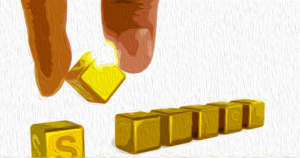
A Shockwave Hits the Banking Sector
Following the U.S. central bank's decision to maintain the federal funds rate, the commercial real estate market experienced turbulence that sent shockwaves through the country's banking sector and beyond. New York Community Bancorp witnessed a significant 13% decline, while Japan's Aozora Bank plunged to its lowest point in eight months, largely due to its involvement with U.S. office loans.
Reality vs. Government Statistics
Government statistics and the recent statements from the U.S. Federal Reserve fail to align with the real-world situation observed on Main Street. During the announcement, the central bank chose to keep interest rates elevated, with Fed Chair Jerome Powell emphasizing the pursuit of "greater confidence" in achieving a 2% inflation rate. However, Powell did not address the turbulence in the banking sector, which had already experienced significant volatility triggered by New York Community Bancorp's disappointing earnings report.
Banking Sector Volatility
During mid-day trading sessions on Thursday afternoon, NYCB witnessed another 13% drop against the U.S. dollar. JPMorgan Chase, the largest lender in the U.S., experienced a 1.25% decline, while Bank of America shed 2.8% and Wells Fargo saw a more substantial 4.26% decrease in its shares. While banks holding long-term Treasury notes share a portion of the responsibility, there is growing concern about the deteriorating U.S. commercial real estate sector as a significant contributing factor to this unsettling trend.
Aozora Bank's Plunge
The repercussions of the U.S. real estate crisis have cast a shadow over Japan's Aozora Bank. On the Tokyo Stock Exchange, the bank's shares plummeted by over 20%, marking their lowest point in more than eight months. Aozora attributes this decline to the persistently elevated U.S. interest rates and the accelerated shift to remote work due to Covid-19, which have created a challenging environment in the U.S. office market along with a concerning lack of liquidity.
The Weight on Credit Growth
Mike Wilson of Morgan Stanley addressed the issue of property-related losses among lenders and emphasized that it is not a systemic issue but rather a weight on credit growth. This highlights the concerns among market observers regarding the distressed state of the U.S. commercial real estate sector. Factors contributing to this include the looming possibility of a 40% decline in commercial property prices, surging vacancy rates, dwindling property values, and a substantial volume of commercial mortgages awaiting refinancing in the near future.
Potential Loan Defaults and Losses
There are also concerns about potential loan defaults, which could result in significant losses for banks. The sale of the Xerox building in Washington DC for a mere $25 million, compared to its previous price of $145 million over a decade ago in 2011, reflects an alarming 83% loss in value. This serves as a stark contrast and highlights the challenges faced by the commercial real estate sector.
What are your thoughts on the volatility in the U.S. banking sector and the challenges faced by commercial real estate? Share your opinions in the comments section below.
Frequently Asked Questions
Can the government seize your gold?
Your gold is yours, so the government cannot confiscate it. You worked hard to earn it. It belongs exclusively to you. There may be exceptions to this rule. For example, if you were convicted of a crime involving fraud against the federal government, you can lose your gold. Additionally, your precious metals may be forfeited if you owe the IRS taxes. However, if you do not pay your taxes, you can still keep your gold even though it is considered property of the United States Government.
Should You Open a Precious Metal IRA?
Precious metals are not insured. This is the most important fact to know before you open an IRA account. There is no way to recover money that you have invested in precious metals. This includes any loss of investments from theft, fire, flood or other circumstances.
Investing in physical gold and silver coins is the best way to protect yourself from this type of loss. These coins have been around for thousands and represent a real asset that can never be lost. If you were to offer them for sale today, they would likely fetch you more than you paid when you bought them.
Choose a reputable company with competitive rates and quality products if you are looking to open an IRA. A third-party custodian is a good option. They will protect your assets while giving you easy access whenever you need them.
Remember that you will not see any returns unless you are retired if you open an Account. Keep your eyes open for the future.
Should You Buy or Sell Gold?
Gold was once considered an investment safe haven during times of economic crisis. Many people are now turning their backs on traditional investments like stocks and bonds, and instead look to precious metals like Gold.
Gold prices have been on an upward trend over recent years, but they remain relatively low compared to other commodities such as oil and silver.
This could be changing, according to some experts. They say that gold prices could rise dramatically with another global financial crisis.
They also pointed out that gold is gaining popularity due to its perceived value, and potential return.
These are some things you should consider when considering gold investing.
- Consider whether you will actually need the money that you are saving for retirement. You can save for retirement and not invest your savings in gold. However, you can still save for retirement without putting your savings into gold.
- Second, make sure you understand what you're getting yourself into before you start buying gold.There are several different types of gold IRA accounts available. Each one offers different levels security and flexibility.
- Last but not least, gold doesn't provide the same level security as a savings account. You may lose your gold coins and never be able to recover them.
Do your research before you buy gold. Make sure to protect any gold you already own.
Statistics
- Gold is considered a collectible, and profits from a sale are taxed at a maximum rate of 28 percent. (aarp.org)
- The price of gold jumped 131 percent from late 2007 to September 2011, when it hit a high of $1,921 an ounce, according to the World Gold Council. (aarp.org)
- If you accidentally make an improper transaction, the IRS will disallow it and count it as a withdrawal, so you would owe income tax on the item's value and, if you are younger than 59 ½, an additional 10% early withdrawal penalty. (forbes.com)
- This is a 15% margin that has shown no stable direction of growth but fluctuates seemingly at random. (smartasset.com)
- Indeed, several financial advisers interviewed for this article suggest you invest 5 to 15 percent of your portfolio in gold, just in case. (aarp.org)
External Links
forbes.com
- Gold IRA – Add Sparkle to Your Retirement Nest Egg
- Understanding China's Evergrande Crisis – Forbes Advisor
investopedia.com
- Do You Need a Gold IRA to Get Retirement?
- What are the Options Types, Spreads and Example. Risk Metrics
cftc.gov
irs.gov
How To
The History of Gold as an Asset
From the very beginning of time, gold was a currency. It was widely accepted around the world and enjoyed its purity, divisibility and uniformity. In addition, because of its value, it was traded internationally. Because there were no internationally recognized standards for measuring and weighing gold, the different weights of this metal could be used worldwide. One pound sterling, for example, was equivalent in England to 24 carats, and one livre tournois, in France, to 25 carats. A mark, on the other hand, was equivalent in Germany to 28 carats.
In the 1860s, the United States began issuing American coins made up of 90% copper, 10% zinc, and 0.942 fine gold. The result was a decrease in foreign currency demand, which led to an increase in their price. In this period, large amounts of gold coin were minted by the United States, which caused the gold price to drop. They needed to pay off debt because they had too much money coming into circulation. To do so, they decided to sell some of the excess gold back to Europe.
Since most European countries were not confident in the U.S. dollar they began accepting gold as payment. However, after World War I, many European countries stopped taking gold and began using paper money instead. Since then, the price of gold has increased significantly. Although the price of gold fluctuates today, it remains one of your most safe investments.
—————————————————————————————————————————————————————————————–
By: Jamie Redman
Title: The Turbulence in the U.S. Banking Sector and the Plight of Commercial Real Estate
Sourced From: news.bitcoin.com/us-banking-sector-volatility-distressed-commercial-real-estate-sector-raises-default-concerns/
Published Date: Thu, 01 Feb 2024 18:30:35 +0000
Did you miss our previous article…
https://altcoinirareview.com/bitget-survey-reveals-optimistic-outlook-for-bitcoins-price-by-2024/
Related posts:
 Vella Finance Drops Crypto Services, Shifts Focus to SME Banking
Vella Finance Drops Crypto Services, Shifts Focus to SME Banking
 Is The President Of El Salvador Acting Like An Authoritarian?
Is The President Of El Salvador Acting Like An Authoritarian?
 Real Estate Investors Are Embracing Bitcoin as a Lucrative Investment Option, Reports Swiss Exchange
Real Estate Investors Are Embracing Bitcoin as a Lucrative Investment Option, Reports Swiss Exchange
 Emerging Real Estate Digital Assets from Moscow Exchange: A 2024 Perspective
Emerging Real Estate Digital Assets from Moscow Exchange: A 2024 Perspective











